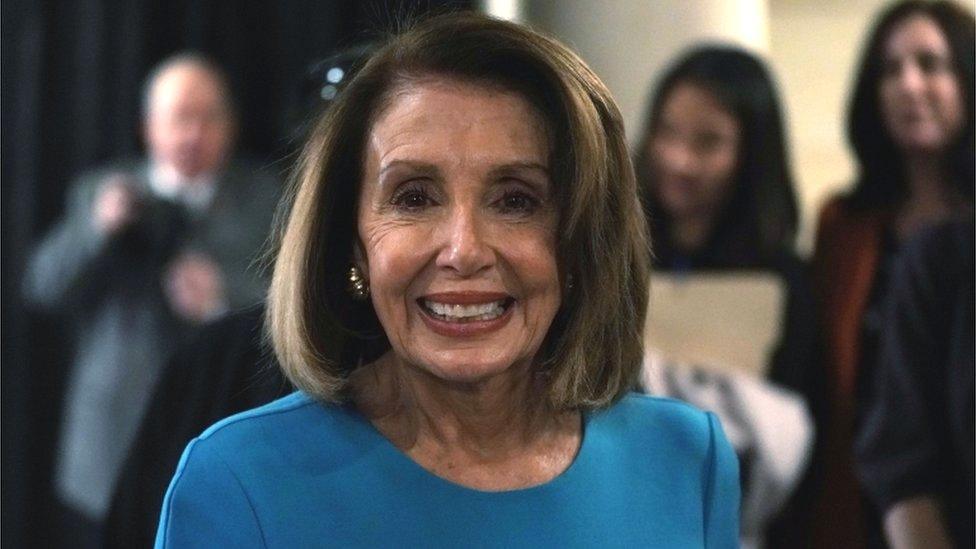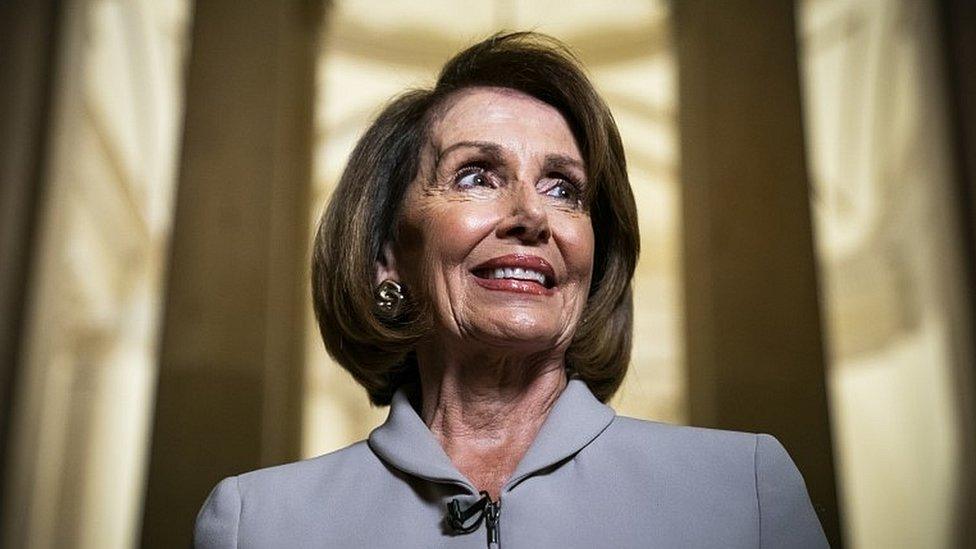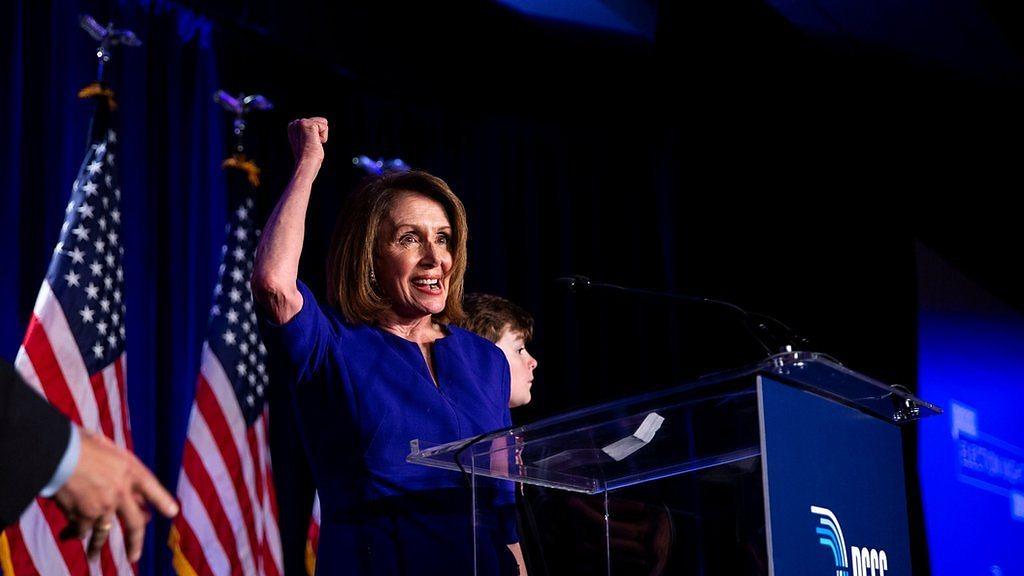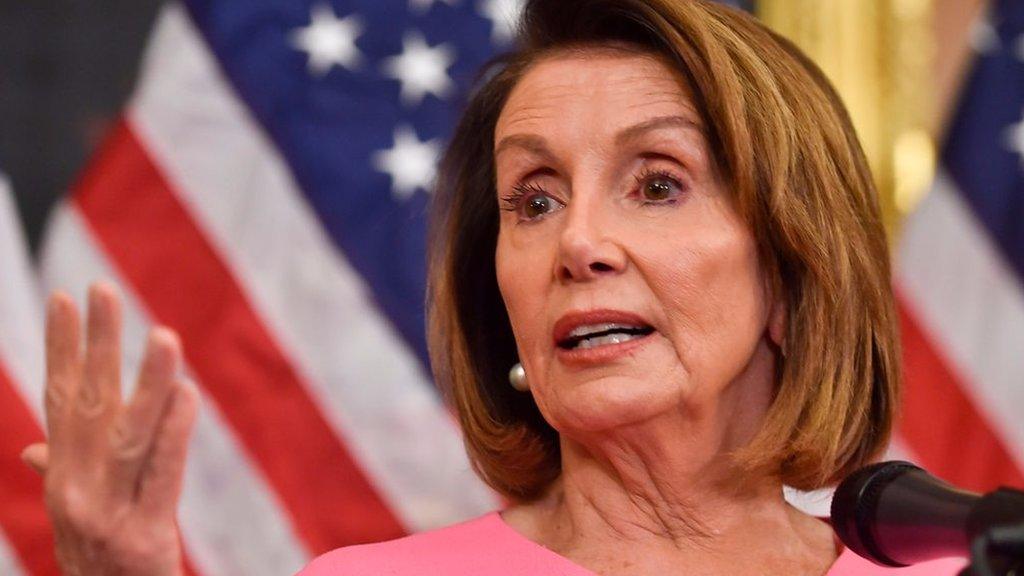Nancy Pelosi wins nomination for Speaker of the House
- Published
The return of the woman Republicans love to hate
Top US Democrat Nancy Pelosi has cleared the first hurdle of her bid to serve again as speaker of the House of Representatives.
A small group of her fellow Democrats opposed Ms Pelosi, but she has secured her party's nomination after negotiations with rank-and-file rebels.
Her opponents argued she was too divisive, but failed to put forward a rival candidate to lead the party.
The full House of Representatives will vote for speaker in the new year.

House Democrats met to elect leadership at the Capitol on Wednesday afternoon
Democrats recaptured control of US Congress' lower chamber in November's mid-term elections and will hold at least 233 out of 435 seats.
On Wednesday, Ms Pelosi, 78, won with a simple majority in a secret ballot by House Democrats. She ran unopposed.
The veteran California lawmaker will need 218 votes to take up the speaker's gavel on 3 January.
Assuming all Republicans oppose her, a revolt by 17 or 18 Democrats would be needed to thwart her.

Pelosi's work isn't over
Analysis by Anthony Zurcher, BBC News
Nancy Pelosi's work isn't over yet. The 32 "no" votes - cast against her in an uncontested race - would be more than enough to block her when the the full House of Representatives votes on 3 January.
How many of those 32 will take such an aggressive move against their own party, however? Probably not many - and almost certainly not more than the 17 needed to block the California Democrat.
Ms Pelosi may be the villain of the right and the face of the Ancien Régime for some dissatisfied Democrats, but she's still one of the best vote-counters and arm-twisters in Congress. Already she's been busy cajoling recalcitrant members on the record to opposing her - with some success.
When she was last speaker, she demonstrated her effectiveness time and time again, holding her party together for tough votes on healthcare reform, financial regulations, climate-change legislation and spending bills.
It's the kind of political muscle that has made many Republicans (quietly) envious. It's also why, come January, odds are good she'll have the speaker's gavel in hand again.

Speaking to reporters in the Capitol, Ms Pelosi described Wednesday's session as "unifying".
"I think we're in pretty good shape," she said. "Are there dissenters? Yes, but I expect to have a powerful vote as we go forward."
A group of around two dozen Democrats have said the party needs new leadership, and 16 signed a letter stating their opposition to Ms Pelosi.
Some of these critics come from vulnerable districts that could swing Republican, while others are either more centrist or progressive members of the party. Some of her allies have portrayed the rebels as sexist.
Ms Pelosi has cut deals with some of her opponents - promising leadership roles in committees and help with individual projects and goals.
On Monday, one of the congressional rebels, Seth Moulton of Massachusetts, said he was open to negotiations with her.
Representative Brian Higgins of New York told the AP news agency, external: "The reality is there is no alternative."
Mr Higgins had initially signed the letter against Ms Pelosi, but changed his mind when she spoke to him about leading a campaign to expand Medicare, a healthcare programme for the elderly.
She was the first woman to serve in the role, between 2007-11.
During the debate about her nomination, Ms Pelosi received support from top Democrats such as civil rights leader and congressman John Lewis, former President Barack Obama and former Secretary of State John Kerry.
- Published4 January 2019

- Published7 November 2018

- Published7 November 2018
